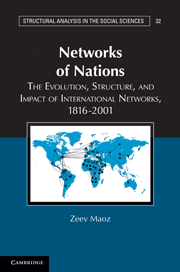Book contents
- Frontmatter
- Contents
- Preface
- Part I What Are International Networks?
- 1 Social Network Analysis and the Study of World Politics
- 2 Fundamental Issues in Social Network Analysis: Concepts, Measures, Methods
- 3 The Network Structure of the International System, 1816–2001
- 4 Security Egonets: Strategic Reference Groups and the Microfoundations of National Security Policy
- Part II The Formation of International Networks: Theory and Evidence
- Part III The Implications of the Networked International Politics Theory
- Glossary
- Bibliography
- Author Index
- Subject Index
3 - The Network Structure of the International System, 1816–2001
Published online by Cambridge University Press: 05 June 2012
- Frontmatter
- Contents
- Preface
- Part I What Are International Networks?
- 1 Social Network Analysis and the Study of World Politics
- 2 Fundamental Issues in Social Network Analysis: Concepts, Measures, Methods
- 3 The Network Structure of the International System, 1816–2001
- 4 Security Egonets: Strategic Reference Groups and the Microfoundations of National Security Policy
- Part II The Formation of International Networks: Theory and Evidence
- Part III The Implications of the Networked International Politics Theory
- Glossary
- Bibliography
- Author Index
- Subject Index
Summary
Introduction
States make decisions about their interactions with other states or with other nonstate actors in the international system. Very often, these decisions have limited and local implications, or so political leaders think most of the time. When two states sign a trade agreement, both sides may think about the benefits that this agreement affords. More often than not, however, these seemingly isolated acts of cooperation have far-reaching consequences involving other nations that were not part of these agreements.
It is instructive to see how this works for international alliances. Consider the situation in Europe in the mid- and late 1930s. France and Britain viewed Germany and Italy as potential rivals. Germany and Italy thought of France and Britain as rivals. The Soviet Union, although it was not friendly with any of these states, was considered by them to be neither ally nor rival. None of these four states knew how the Soviet Union would behave in the event of a conflict between France and a coalition of Germany and Italy. On August 22, 1938, Germany and the Soviet Union signed the Ribbentrop-Molotov Agreement. The agreement stipulated that in the event of a war between the France-UK coalition and the Germany-Italy coalition, the Western allies could not rely on the Soviet Union’s help, nor could they assume that Germany would be attacked by (or would be interested in attacking) the Soviet Union. The Soviet Union also had a potential enemy in the East: Japan, which also had a neutrality pact with Germany and Italy. When Germany attacked the Soviet Union in 1941, Stalin’s key concern was that Japan would attack the Soviet Union from the east. Until they had received reliable information about the Japanese decision not to attack, Soviet decision makers had been forced to concentrate considerable numbers of troops in the east in preparation for such an attack. This affects the uncertainty that all states in the system – not only the two signatories of the nonaggression pact – have about the behavior of various allies (e.g., Bueno de Mesquita 1981).
- Type
- Chapter
- Information
- Networks of NationsThe Evolution, Structure, and Impact of International Networks, 1816–2001, pp. 93 - 108Publisher: Cambridge University PressPrint publication year: 2010

